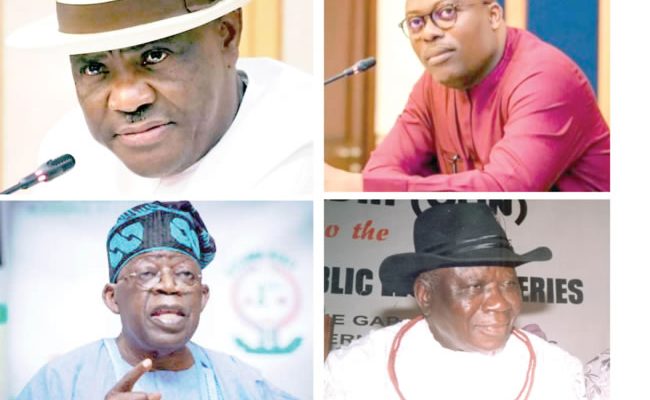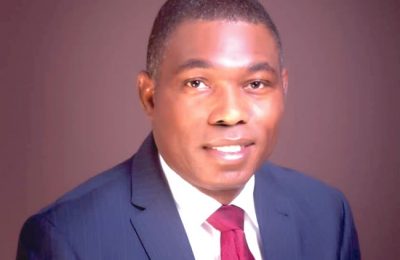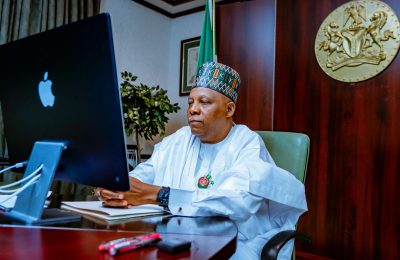Resolutions arrived at a meeting brokered by President Bola Tinubu between the two warring camps in the Rivers State seems to have added new twists to the debilitating crisis rocking the Rivers as other stakeholders kick, writes KUNLE ODEREMI.
FOR the main combatants in the political crisis rocking Rivers State: Governor Siminalayi Fubara and the Minister of the Federal Capital Territory (FCT), Mr Nyesom Wike, the initial tempest may appear receding, but there is a fresh round of controversy. The controversy is part of the fallouts of the latest intervention by President Bola Tinubu into the imbroglio that has almost put asunder the hitherto mutual relationship between Wike the political godfather and Fubrara, the political godson. The action of the president came as the feud assumed more frightening dimensions in recent weeks, with each camp set for the broke, splitting the ranks of other major stakeholders in the oil-producing state down the line.
Elders and leaders of thought from the state, among them the leaders of the Ijaw Nation, Chief Edwin Clark and former governor of Rivers, as well as former leaders of militant groups that once made the Niger Delta almost ungovernable, joined the fray, raising concern over the rising tension and apprehension caused by the faceoff between Wike and Governor Fubara. The majority of the leaders and organizations warned that the crisis triggered primarily on the alleged plot to initiate an impeachment move against the governor could reenact the recent past of violence before it was tamed through a presidential amnesty programme for militants that laid siege to the creeks. Thus, the elders and leaders of thought in Rivers made a passionate plea to President Tinubu to wade in by way of calling his minister to order. In order words, their calls were unambiguous: that the president prevails on Wike to give the governor a breathing space.

Resolution
When eventually the president chose to act, his action led to a closed-door meeting on Monday that lasted till night fall. But most remarkable about the intervention were the immediate and long term implications of the eight-point resolution of the meeting for the delicate disequilibrium currently prevalent in Rivers political space. Among those present at the about three hours of the talks held at the Aso Rock Villa, Abuja, were the president, Governor Fubara; his deputy, Mrs Ngozi Odu; a former governor of the state, Dr Peter Odili and the immediate past governor now Minister of the Federal Capital Territory (FCT), Wike. The FCT Minister, Wike, who was acclaimed to be instrumental in the emergence of Fubara and other elected officers in the last general elections, arrived at the State House at about 7pm and was ushered into the president’s office, where the meeting was held. Also present at the meeting were the Vice President, Kashim Shettima; the National Security Adviser, Nuhu Ribadu, and the President’s Chief of Staff, Femi Gbajabiamila. The resolution was signed by Fubara; his deputy, Ordu; Wike; Ribadu; factional Speaker of the Rivers State Assembly, Martin Amaewhule; Chairman of the Peoples Democratic Party in Rivers State, Aaron Chukwuemeka, and his All Progressives Congress counterpart, Tony Okocha.
The imbroglio between Wike and Fubara blew into the open from October 29, when the Assembly was razed by fire, following alleged moves to impeach Fubara The crisis led to choice of two factional speakers – Matins Amaehule, who is loyal to Wike; and Edison Ehie, a strong supporter of Fubara. In another dramatic twist to the crisis, 27 members of the Assembly loyal to Wike dumped the PDP platform that brought them into the Assembly to join the APC. Again, Tinubu had to meet with the stakeholders from Rivers after which an eight-point resolution was adopted.

In the eight-point resolution, Tinubu issued a number of directives, not pieces of advice, that all lawsuits instituted in the courts by Fubara and his team on the crisis in Rivers be withdrawn immediately. Fubara was directed to re-present the 2024 appropriation bill he earlier presented to a four-member state House of Assembly to the full Assembly.
The resolutions read: “All matters in court to be withdrawn immediately. Also, all impeachment proceedings initiated against the governor by the state House of Assembly should be dropped immediately. “The leadership of the Rivers State House of Assembly as led by the Rt. Honourable Martin Amaewhule shall be recognised alongside the 27 members who resigned from the PDP; the remunerations and benefits of all members of the Rivers State House of Assembly and their staff must be reinstated immediately and the Governor of Rivers State shall henceforth not interfere with the full funding of the Rivers State House of Assembly (RSHA) to choose where to sit and conduct legislative business without interference/hindrance from the executive; Governor Fubara to represent the state budget to properly constituted RSHA; Names of all commissioners who resigned to be resubmitted to the House of assembly for approval; No caretaker committee for local government in Rivers state; dissolution of local government administration is null and void.”
However, the complexity of the resolutions after the peace brokered by the president has stirred another wave of controversy and public debate. The contents of the document, legality of the key resolutions and representation at such a crucial meeting meant to resolve a knotty and contentious issues sparked outrage, especially among critical stakeholders from the state nay the Niger Delta. Elder statesman and leader of the Niger Delta, Chief Edwin Clark and a former chairman of the Nigeria Bar Association (NBA), Warri branch, Chief Emmanuel Uti, are miffed by the resolutions reached at the meeting with President Bola Tinubu to resolve the impasse in Rivers. Clark, who described the agreement as unconstitutional, expressed reservations over the manner the resolutions were reached with a few representatives from the camp of Governor Fubara.
According to the first republic minister, the whole exercise amounts to an attempt to hold the governor hostage by those forces against him. Besides, he accused the president of an utter disregard for the 1999 Constitution and the limit of his power and authority as president. Similarly, Clark said Wike ought to know better as a lawyer the import of the resolutions, which tried to override the power and status of an elected incumbent governor of a state. Clark said: “The composition of the attendees of the meeting was one sided in favour of Nyesom Wike, the Minister of the Federal Capital Territory (FCT), because while Martins Amaewhule, a former Speaker, (because he has automatically lost his seat the very moment he decamped to another political party), was present at the meeting, it would have only been equitable and expedient, for Edison Ehie, the Speaker as affirmed by constitutional provisions and by the granting of the court, to be in the meeting, if there were sincerity of purpose.
“The eight resolutions reached are the most unconstitutional, absurd and obnoxious resolutions at settling feuding parties that I have ever witnessed in my life. As a matter of fact, some media captured it very well when they described it as directives. And for the fact that such thing was done at the Villa, the seat of the Federal Government of Nigeria, is sacrilegious. It is obvious that Governor Siminialayi Fubara was ambushed and intimidated into submission. President Tinubu should know that with all the powers he possesses, he cannot override the Constitution. From all that transpired at the meeting, the laws of the land have not been obeyed. President Tinubu simply sat over a meeting where the Constitution, which is the fulcrum of his office as President and which he swore to uphold and abide by, was truncated and desecrated. Twenty-seven or so members (because the figure is not certain), of the Rivers State House of Assembly left the political party on which platform they were elected. The Constitution of the Federal Republic of Nigeria is very clear on that. Section 109 is quite clear on that. Nyesom Wike is quite abreast of these constitutional provisions.
“A court of competent jurisdiction has pronounced Edison Ehie as the Speaker of the Rivers State House of Assembly. That ruling has not been vacated and based on that, he exercised the duties conferred on him by Section 109 (2) as quoted above, when the 27 or so members openly defected to APC, waving the flags of the party and singing President Tinubu’s campaign songs, from the Peoples Democratic Party (PDP). As at today and going by the Constitution, the Rivers State House of Assembly has four members who are recognised by the laws of the land.
“Therefore, on what premise is Mr. President saying that the 27 decamped members should go back to the House? Under what political party, the PDP or the APC. The directives of Mr. President are absurd and cannot hold water. Mr. President should be aware that Siminialayi Fubara, today, is the elected governor of Rivers State in the same manner Bola Ahmed Tinubu is the elected President of the country. And as a governor, Mr Fubara possesses all the powers as conferred on him by the Constitution. Another “directive” of Mr President that the names of the Commissioners who were nominated by Nyesom Wike and who resigned on their own volition, and who have lost their trust in Governor Fubara, should be represented to the Rivers State House of Assembly for clearance to become Commissioners again, is ridiculous. Who is nominating them to become Commissioners again? Is it Mr. President?
“Another unthinkable “directive” of Mr. President is that a budget which has been passed into law, should be represented. It is absolutely ridiculous and unconstitutional. By President Tinubu’s actions and directives, he has overruled the Constitution of the country; he has shaken the foundation of the country’s democracy.”
But, a former NBA chairman, Warri branch, Mr Emmanuel Uti, wants Fubara to follow, to the letter, the resolutions reached since he agreed to be at the meeting. “On the President’s directives or advice, it is my opinion that it is a mere peace move to bring the tension in Rivers State down. The state could be up in flames if the President did not intervene. The directives or interventions have nothing to do with the Constitution. The PDP has an opportunity at this stage to counter claim to the suit filed by the 27 House of Assembly law makers at Abuja or file a new claim, contending that they should vacate their seats, having defected. On whether Fubara should buy into the settlement initiatives, my opinion is that Fubara has no choice. He went in for the peace settlement, so he has to abide by whatever the outcome.”
A legal practitioner, Chief Supo Shonibare raised the issue of subtle moves to foist a one-party system on the country. He said the constitution was not ambiguous on the fate of a defected lawmakers. But he noted that the president is entitled to look for resolutions that will prevent what may result into the breakdown of law and order in any part of Nigeria, adding that this could be his own solution to the Rivers crisis.
“He may also be courting the governor to join his party. Wike is already an apostle of APC. We have had a tradition of many past presidents in this Republic, apart from Umaru Yar’Ardua and Goodluck Jonathan, attempting to strategically work to usher in a one-party system. It will continue to be an unsuccessful ploy. It is however incumbent upon PDP, as a political party to seek a declaration in Court to declare the seats of the 27 defecting Rivers State members of State Assembly vacant. The constitutional provision is very clear. If an elected member defects without there being factionalization in the party. If a claim of factionalization is made, then that claim cannot be simply a red herring to justify the defection, it has to be a structural party division on a national scale; as the Supreme Court has determined. Our Courts too have often being unable to react robustly, by accelerating the hearing processes to make such a determination, whenever such clear cut cases are presented before it. Those blatantly floating the provisions are encouraged that they will find solace in the snail-speed approach of our Judiciary. Let’s hope our Courts will be more proactive in this instance & offer a respite able to cure the mischief the Constitution- as defective as it is, tried to cure with this provision. We need to make those who obtained a mandate under the auspices of one Political party defecting at will, after & having the hubris of there not being consequences as being no longer the vogue. It’s an unconscionable act. Ballot papers only have the acronym & logo of political parties & not any candidate. The judiciary has also been part of the problem in our inability to deepen integrity & propriety in our body politik. The Supreme Court got it wrong in their judgement in the Amaechi’s Appeal years back, installing a fellow who was not the flag bearer of the Party in the campaign as Governor. What they deemed as an equitable remedy relief in that case on a pre- election Party primaries internal party matter, was a most misconceived application of equitable remedy.”
Meanwhile, the Northern Elders Forum (NEF) said the outcome of the Abuja meeting should be celebrated instead of condemnation. The Director of Publicity and Advocacy of the forum, Abdulazeez Suleiman, said: “We all know that Nigeria’s political space has been characterized by a constant struggle for dominance and control among political gladiators. This power play is fueled by the emphasis on individual empowerment rather than the strengthening of institutions. Consequently, political actors seek to consolidate power and influence, often at the expense of the collective interest.” He added that the unfolding scenario in Rivers was not an isolated incident but rather a continuation of the power play that has characterised Nigerian politics since the advent of democracy in 1999. He noted: “The emphasis on individual empowerment rather than institutional strengthening has perpetuated struggles for dominance and control among political gladiators. As the president of the Federal Republic of Nigeria and the Commander in Chief of the Armed Forces, it is the primary responsibility of the President Tinubu to ensure peace, stability, and security in all parts of the country. When peace breaks down in any region, it becomes the duty of the President to take appropriate action. In the case of Rivers, it is commendable that the President was fully prepared and equipped to take decisive action if a resolution was not reached. This demonstrates the President’s commitment to upholding peace and stability in the country. The readiness to take hard action serves as a deterrent to those who may seek to disrupt the peace and security of any region.”
“It is a great relief to the people of Rivers State and Nigerians at large that a resolution has been reached in the ongoing power struggle. The resolution signifies a commitment to peaceful coexistence and the prioritization of the collective interest over individual ambitions. This outcome should be celebrated as it fosters stability and progress in the state and the nation as a whole, they said.
”The agreement has thrown up wide-ranging issues on the limit of the president’s power and mandate, provisions of the 1999 Constitution and the Electoral Act 2022 on what constitutes the internal affairs of political parties, as well as matters pertaining to defection by elected public officials from the party through which they are elected into office. Section 68 (1) of the 1999 Constitution expressly deals with the issue of defection, especially on the fate of whoever undermines the section. The section provides that, “A member of the Senate or of the House of Representatives shall vacate his seat in the House of which he is a member if — (g) being a person whose election to the House was sponsored by a political party, he becomes a member of another political party before the expiration of the period for which that House was elected.” The constitution laid down the condition under which defection can be allowed as “Provided that his membership of the latter political party is not as a result of a division in the political party of which he was previously a member or of a merger of two or more political parties or factions by one of which he was previously sponsored.”
Unfortunately, the law has consistently been undermined by government in power in concert with overzealous political leaders. Despite consistent public outrage, the political parties and their demagogues have encouraged the culture impunity, gross abuse of due process and diligence as well as disregard for the Constitution and the Electoral Act. Those forces made sure that a bill designed to compel any elected political office holder to vacate his seat for defecting to another political party was killed. It had sought to “alter the Provisions of the Constitution of the Federal Republic of Nigeria, 1999 to Provide for the Termination of Tenure of Certain Elected Officials on Account of Political Party; and for Related Matters.” It was sponsored in 2020 by a member of the Peoples Democratic Party from Taraba State, Rimande Kwewum, the bill, in particular, to amend Sections 144(1) and 189(1) of the constitution “to check incidents of defections, that is, cross-carpeting or abandoning the political party that sponsored a President, vice-president, governor or deputy governor, as the case may be, for another political party, in the absence of a merger of political parties, division or factions within the sponsoring political party.” The bill was also premised on what was perceived as the mentality of legislators to simply see the parties as vehicles to access power.
Similarly, the Independent National Electoral Commission (INEC) at the presentation of its ‘Report of the 2019 General Election, canvassed that lawmakers in the national and state houses of assembly should be barred from defecting from one party to another while in office. According to the report, “such defectors should automatically lose their seats except in the case of merger of two or more parties.” INEC advocated that the constitution should be amended to arrest the trend towards restoring sanity and deepening democratic values in Nigeria.
YOU SHOULD NOT MISS THESE HEADLINES FROM NIGERIAN TRIBUNE
How I helped Peter Obi overcome impeachment plot as Anambra governor — Sowore
Self-styled human rights activist, Omoyele Sowore has revealed an age-long secret about Peter Obi, the Labour Party presidential candidate in…
Yuletides: Low-key Christmas looms as poultry birds price rise than last years’
In less than 10 days to Christmas, the price of poultry birds in Ibadan is projected to be higher than last year mostly because of…
Comedian Mark Angel apologises over Emanuella’s viral dance video
Nigerian comedian Mark Angel has issued an apology following the circulation of a viral video featuring his…
A 35-year-old suspect, Akeem, who was arrested by detectives in Ogun State Police Command after…
Top 13 facts about Buhari at 81
As he marks his 81st birthday on Sunday December 17th, roughly six months after the completion of his two terms as…
CAF crowns Nigeria’s Osimhen African Player of the Year
Super Eagles striker, Victor Osimhen, has been crowned the African Player of the Year 2023 by the Confederation of…







